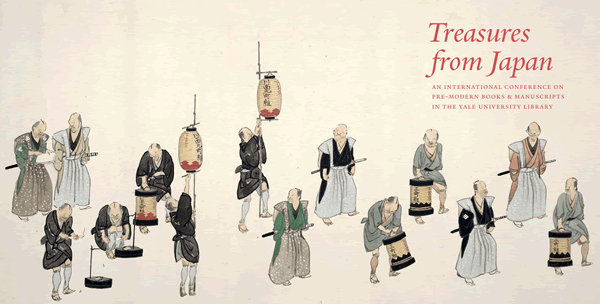On March 5-6, 2015, a distinguished group of scholars convened on campus for “Treasures from Japan: An International Conference on Pre-Modern Books & Manuscripts in the Yale University Library.” The conference was sponsored by the Council on East Asian Studies, the Beinecke Rare Book & Manuscript Library, and the East Asia Library, in cooperation with the Historiographical Institute (University of Tokyo) and the National Institutes for the Humanities (Japan).
In the first half of the 20th century, Asakawa Kanʻichi (1873-1948), Yale’s great pioneer in the field of Japanese history, set about assembling a rich collection of primary materials related to all aspects of the archipelago’s pre-modern past. Over the past five years, a team of distinguished scholars from the Historiographical Institute at the University of Tokyo have undertaken a systematic study of these “Treasures from Japan,” helping Yale to re-evaluate their significance and ensure their proper preservation. Yale has also been fortunate to be able to draw upon the expertise of Professor Suzuki Jun of the National Institute for Japanese Literature to conduct a proper survey of the University’s collection of Edo-period hampon (printed books). All of these collaborations have helped to stimulate new efforts by faculty, librarians, conservators and students at Yale to more fully explore and understand the remarkable range of original materials available in the Yale University Library for studying pre-modern and early modern Japan (including some that pre-date Asakawa’s tenure).
The two-day international conference showcased the fruits of these recent efforts to study the library collections, to draw broader attention to the possibilities for research that exist here at Yale, and to open up a discussion of how the Yale collections (and others like them) might best be used in the 21st century to further enrich the study of pre-Meiji Japan in North America and beyond. All papers were presented in either Japanese or English, and discussions were conducted in both languages. Peter Kornicki, Emeritus Professor of Japanese Studies from the University of Cambridge, delivered the keynote lecture on “Jellyfish and Ginger: Medical Books and the Abandonment of Movable Type in the Early Edo Period.” A complete schedule of events can be viewed on the website of the Council on East Asian Studies.
Directly following the conference, the Council on East Asian Studies sponsored a Workshop on Pre-Modern and Early Modern Japan on March 7 to foster greater dialogue and debate among scholars of all aspects of pre-Meiji Japan. The workshop provided a forum for specialists from different disciplines to talk with each other, for scholars based in Japan and North America to exchange views on the state of the field(s), and for graduate students to get to know scholars from a range of different institutions. The day-long workshop was organized around a series of panels, but instead of formal papers, speakers presented brief “intellectual provocations,” which stimulated lively discussion on topics ranging from “What Good Are the Disciplines for Pre-Meiji Japan?”, “The Early Modern ‘Medieval,’” “Japan’s (Pre-Meiji) Japan/America’s (Pre-Meiji) Japan? Cultures of Scholarship and Global Perspective” to “The Future of the Past: Grad Student Perspectives on Pre-Meiji Japan.”

